Original Title: How The IMF Prevents Global Bitcoin Adoption (And Why They Do It)
Original Author: Daniel Batten, BitcoinMagazine.
Original Translation: Luffy, Foresight News
In recent years, the International Monetary Fund (IMF) has woven a web of measures to curb the development of Bitcoin:
- Successfully forced El Salvador to abandon Bitcoin as legal tender and rescind some other Bitcoin policies
- Successfully pressured the Central African Republic to repeal its Bitcoin bill in 2023 through regional banking institutions
- Resulted in Argentine President Milei's Bitcoin promises during the campaign failing to translate into actual action
- Expressed "serious concerns" over Pakistan's Bitcoin plans
- In loan negotiations, cryptocurrencies are always viewed as "risks"
Here is a summary table:

As we can see, the only countries able to resist IMF pressure are El Salvador (before 2025) and Bhutan. Every country that has accepted IMF loans and attempted to adopt Bitcoin at the national level has been successfully thwarted or largely defeated by the IMF.
Why has the IMF been so successful in preventing global countries from adopting Bitcoin (except Bhutan)? And why is it so proactive?
In this detailed report, we will analyze three countries where the IMF has successfully resisted Bitcoin adoption and point out its potential to achieve the same results in Pakistan. In the final section of this report, we explore the IMF's five concerns regarding Bitcoin and how, despite various nation-states abandoning or partially abandoning Bitcoin from the top down, Bitcoin continues to thrive at the grassroots level.
1. Central African Republic: When Colonial Currency Meets Digital Hope

The Central African Republic (CAR) uses the Central African CFA franc (CFA franc). The CFA is not just a currency but a geopolitical chain backed by France and managed by the Central Bank of Central African States (BEAC). Among its 14 member countries, 6 Central African nations (including CAR) are still required to keep 50% of their foreign exchange reserves in Paris.
This control over foreign exchange reserves has fostered economic dependency while creating a favorable export market for French goods. For example, in 1994, under pressure from the West (especially the IMF), the CFA was devalued by 50%, leading to skyrocketing import costs, allowing exporters (mainly from the EU) to acquire resources from CFA countries at half price. Locally, this had devastating effects, resulting in widespread wage freezes, layoffs, and massive social unrest.

When the Central African Republic announced the adoption of Bitcoin as legal tender in 2022, BEAC and its regulatory body, the Central African Republic Business Advisory Council, immediately declared the law invalid, citing violations of the treaty establishing the Central African Economic and Monetary Community. This was not bureaucratic red tape but a warning from the guardians of the "Francafrique" currency.

Why is this important? To date, the Central African Republic's economy heavily relies on IMF assistance, with its $1.7 billion external debt (61% of GDP) meaning that defying BEAC risks financial isolation.
The IMF's Quiet Actions
The IMF acted swiftly. On May 4, 2022, within two weeks, the IMF publicly condemned the Central African Republic's "dangerous experiment," stating that it contradicted the legal framework of the Central African Economic and Monetary Community's crypto ban. The IMF indicated that this move posed "significant legal, transparency, and economic policy challenges," similar to previous concerns regarding El Salvador's adoption of Bitcoin: risks to financial stability, consumer protection, and fiscal liabilities (notably, these risks did not materialize in El Salvador).
But their real weapon is leverage. As the largest creditor of the Central African Republic, the IMF linked a new $191 million medium-term credit arrangement to policy compliance.
Timeline Revealed
The following table traces the IMF's behind-the-scenes actions:
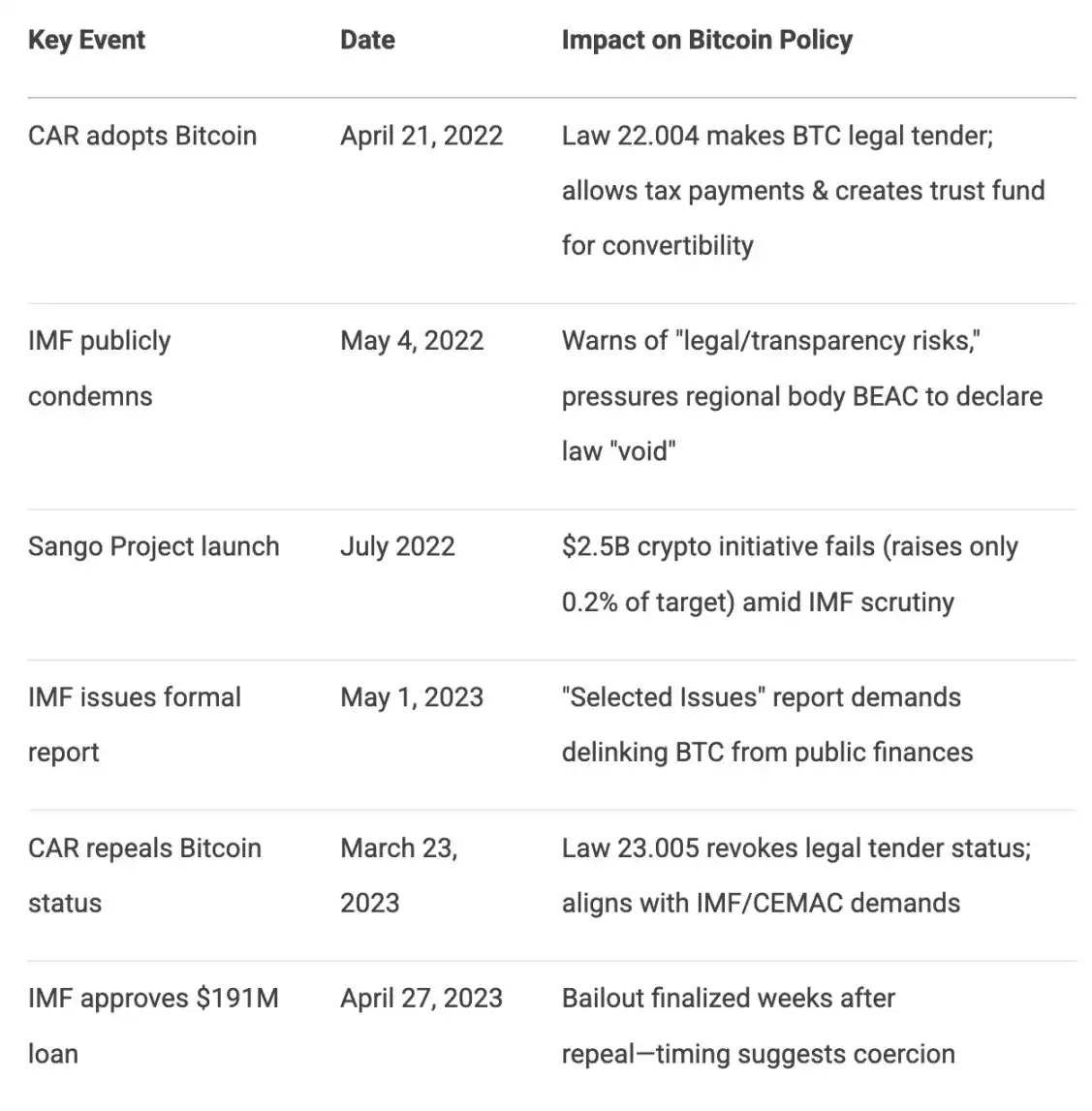
The key to undermining the Central African Republic's Bitcoin ambitions was ensuring that the Sango project (a blockchain initiative launched by the Central African Republic government aimed at selling "e-residency" and citizenship for $60,000 in Bitcoin) would not proceed.
Sango Project: Coincidence or Conspiracy?
In July 2022, the Central African Republic launched the Sango project, aiming to raise $2.5 billion, equivalent to the country's annual GDP.
The Sango project failed to succeed. By January 2023, it had raised only $2 million (0.2% of the target). The IMF reported that the failure was due to "technological barriers with an internet penetration rate of only 10%," but our analysis reached a starkly different conclusion. Two factors destroyed the Sango project:
- Investor exodus
- A ruling from the Central African Republic's Supreme Court that blocked the Sango project
However, upon closer examination, both factors suggest IMF involvement.
- Investor Flight
The IMF's role in this process was indirect but compelling.
On May 4, 2022, the IMF expressed concerns about the Central African Republic's adoption of Bitcoin, stating it posed significant legal, transparency, and economic policy challenges. This statement was made before the launch of the Sango project, emphasizing risks to financial stability and regional economic integration, which may have deterred investors.
In July 2022, during a staff visit for program review, the IMF pointed out that "economic downturn due to rising food and fuel prices" could exacerbate investor caution.
Reports also mentioned that the IMF and the Central African Republic Business Advisory Council warned of the inherent risks of the Central African Republic's crypto initiatives, further heightening concerns.
The timing of these IMF statements coincided with the observed investor exodus, indicating that its cautious stance as an authoritative financial institution may have influenced market perceptions.
Supreme Court Ruling
On the surface, the Supreme Court ruling appears to be an independent event, but a deeper investigation raises doubts about the independence of the Central African Republic's judicial system—its corruption perception index ranks 149 out of 180 (extremely low).
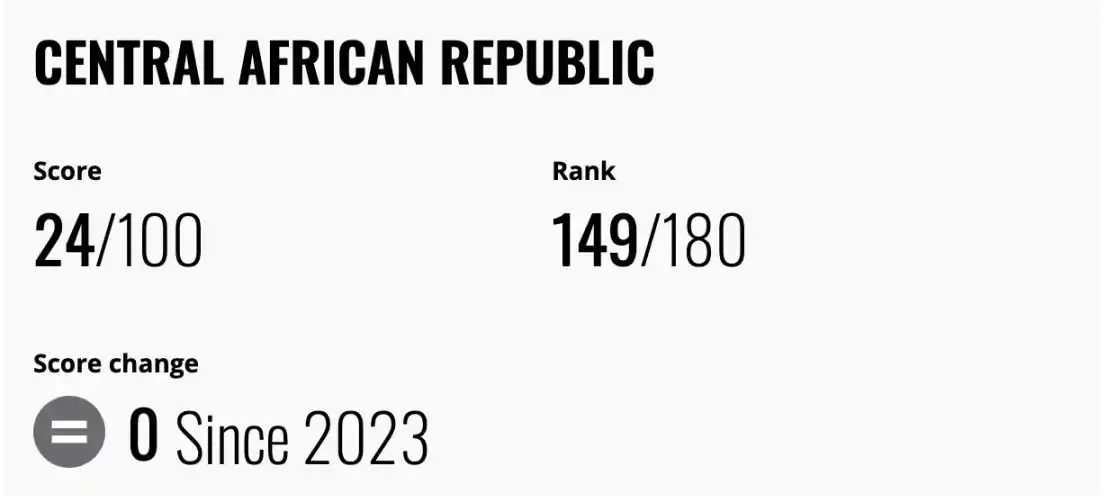
As previously mentioned, one week after the Central African Republic announced its Bitcoin strategy, on May 4, 2022, the IMF expressed "concerns," including risks to financial stability, transparency, anti-money laundering efforts, and macroeconomic policy management challenges due to volatility.
117 days later, on August 29, 2022, the CAR Supreme Court ruled the Sango project illegal. Transparency International (such as Gan Integrity) stated that the Supreme Court, part of the Central African Republic's judicial system, is one of the country's most corrupt institutions, facing issues of inefficiency, political interference, and potential bribery or political pressure.

The collapse of the Sango project became the IMF's "Evidence A": "proving that Bitcoin cannot operate in fragile economies." But the reality is that the IMF's continuously expressed "concerns" preemptively undermined the project environment, making this conclusion possible.
5,200 miles away, in the small country of Bhutan, we see a starkly different picture: Bitcoin has successfully taken root without IMF "involvement."
The Obvious Conclusion: Bitcoin's Resilience Transcends Borders
The reversal in the Central African Republic is not about Bitcoin's viability but about power. The IMF used regional banking alliances to cut off the Central African Republic's capital sources and leveraged the $191 million loan to eliminate the threat to financial sovereignty. When the Sango project faltered, the trap suddenly closed.
However, this failure also revealed Bitcoin's enduring strength. Note what the IMF failed to destroy:
- Bitcoin remittances in Nigeria continue to bypass dollar channels, saving millions in fees
- Bitcoin trading in Kenya thrives without IMF approval
- El Salvador continues to accumulate Bitcoin despite the mention of Bitcoin 221 times in loan conditions

The pattern is clear: where grassroots adoption takes root, Bitcoin can survive. But for countries that announce top-down Bitcoin plans while burdened with significant IMF loans, all have faced overwhelming resistance: El Salvador, Central Africa, Argentina, and now Pakistan.
The Central African Republic's outstanding $115.1 million IMF loan balance subjects it to IMF pressure. In countries like Bhutan, which have no IMF loans, Bitcoin slips through the IMF's fingers. Every peer-to-peer payment, every Lightning Network transaction, erodes the foundations of the old system.
The IMF won this round in the Central African Republic, but the struggle for global financial sovereignty has only just begun.
2. Argentina's $45 Billion Bitcoin Adoption Barrier
If the Central African Republic's Bitcoin plans were thwarted, Argentina never even got off the ground. President Milei's pre-election statements hinted at significant moves, but ultimately there was no progress. Was this just empty talk from politicians during the election, or was there more to the story? This section will unveil the truth behind Argentina's failed Bitcoin plans.
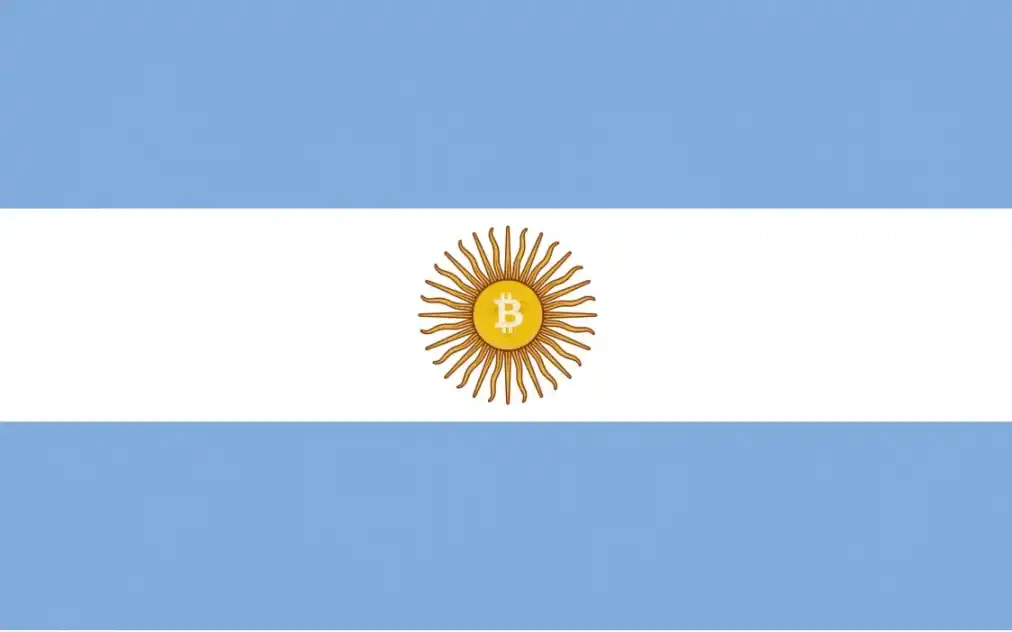
Understanding the progress of Bitcoin adoption is akin to assessing whether a rocket can achieve escape velocity: we must examine both thrust and resistance simultaneously.
I am an optimist: I believe Bitcoin will prevail because it is clearly a better solution to our currently broken fiat currency system. But I am also a realist: I think most people underestimate the power of the conservative forces opposing Bitcoin.
When I ran a tech company, we faced the same situation. Our technology was ten times better than traditional systems—faster and more cost-effective—but they were not going to give up their existing monopolies easily.
What Happened in Argentina?
When liberal Javier Milei was elected President of Argentina in November 2023, many Bitcoin advocates rejoiced. This leader called central bank officials "frauds," vowed to abolish the Argentine central bank, and praised Bitcoin as a "natural response to central bank fraud." This case became a litmus test for whether Bitcoin could gain mainstream recognition through government adoption rather than grassroots growth.

However, 18 months into his presidency, Milei's Bitcoin vision has yet to materialize. Why? The IMF's $45 billion funding controls the country's Bitcoin development.
The IMF's Veto Power in Argentina
Restrictions were already in place when Milei was elected. On March 3, 2022, the previous Argentine government signed a $45 billion IMF bailout agreement. In the following weeks, details revealed that the agreement included an unusual clause: a requirement to "prevent the use of cryptocurrencies." This was not a suggestion but a loan condition recorded in the IMF's letter of intent, which mentioned concerns about "financial disintermediation."
Direct impacts:
- The Argentine central bank prohibited financial institutions from engaging in cryptocurrency transactions.
- Despite Milei's pro-Bitcoin rhetoric, this policy was enforced during his tenure.
Milei's Shift
After taking office, Milei:
- Reduced the monthly inflation rate from 25% to below 5% (by May 2024).
- Lifted currency controls (by April 2025).
- Secured a new $20 billion IMF agreement (by April 2025).
But the core proposals in his declaration (Bitcoin adoption and abolishing the central bank) were conspicuously absent. The reason is simple: Argentina owes more to the IMF than any other country, giving the IMF unparalleled leverage.
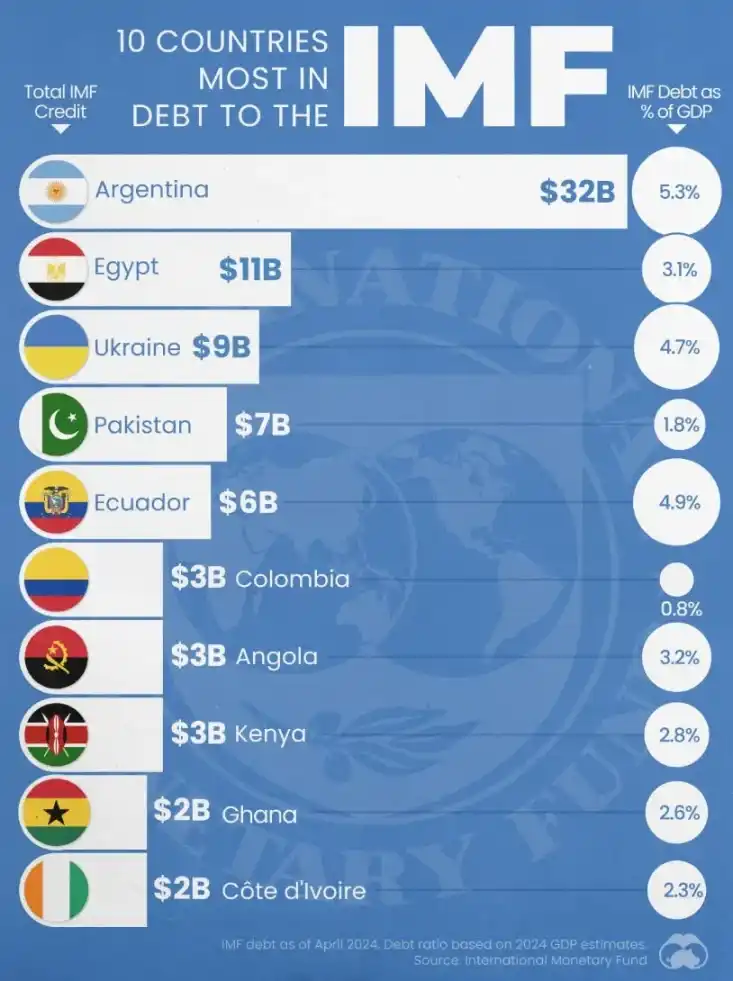
However, the case of Argentina is ironic: despite the IMF preventing official Bitcoin adoption, Argentinians are still embracing Bitcoin. From 2023 to 2024, cryptocurrency holdings in South America grew by 116.5%, with Argentina having the highest holding rate in the region at 18.9%, nearly three times the global average. Moreover, this percentage has surged due to citizens hedging against a high annual inflation rate of 47.3% (by April 2025). This is a quiet rebellion that the IMF cannot control.
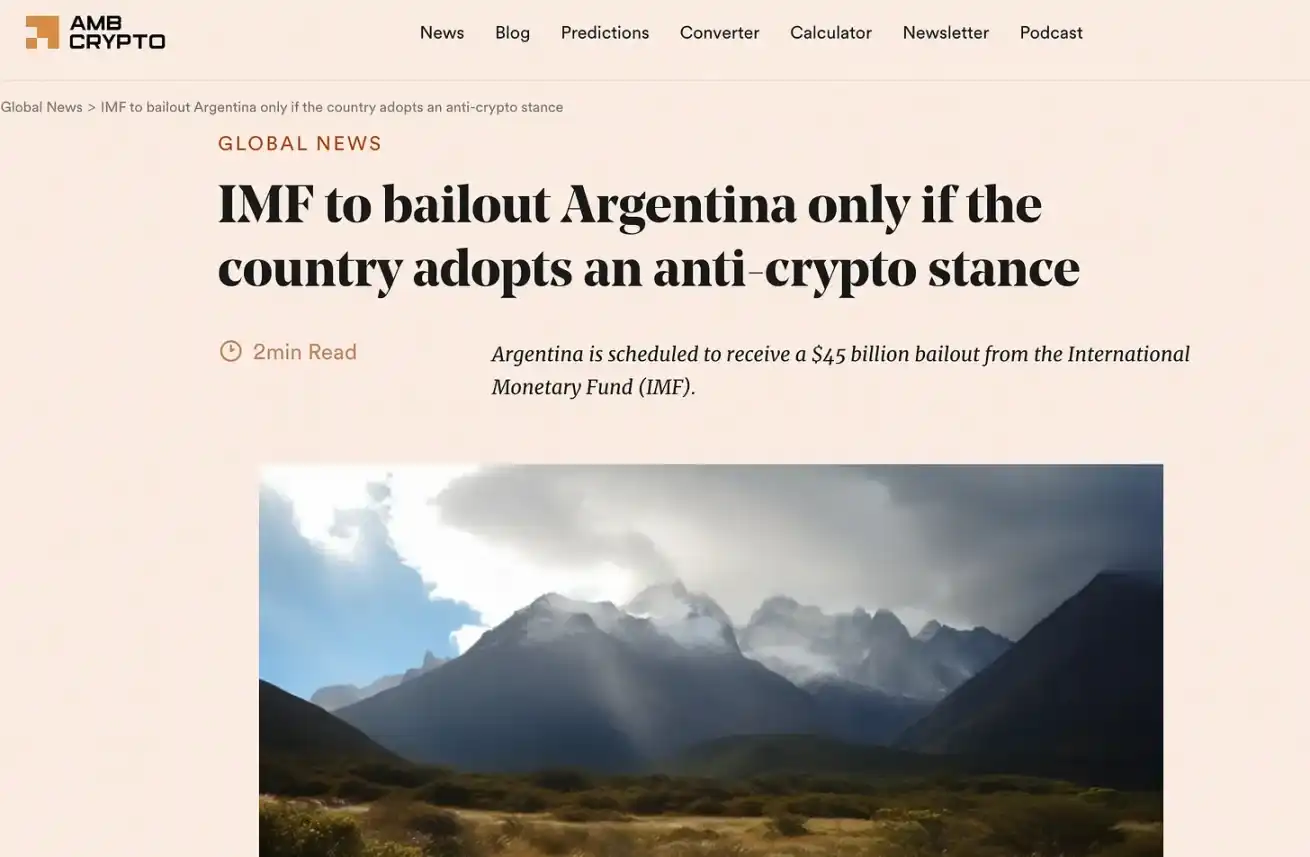
What Happens Next?
All eyes are on the midterm elections in October 2025. If Milei gains support, he may challenge the IMF's red lines. But for now, the lesson is clear: when a country borrows from the IMF, its monetary sovereignty is compromised.
Key Points
- The IMF's 2022 loan explicitly linked Argentina's bailout to anti-crypto policies.
- Milei prioritizes economic stability over Bitcoin advocacy to gain IMF support.
- Similarities exist between El Salvador, Central Africa, and now Pakistan, revealing the IMF's consistent strategy.
- Argentinians are circumventing restrictions through grassroots Bitcoin adoption.
3. El Salvador: A Partial Victory for the IMF
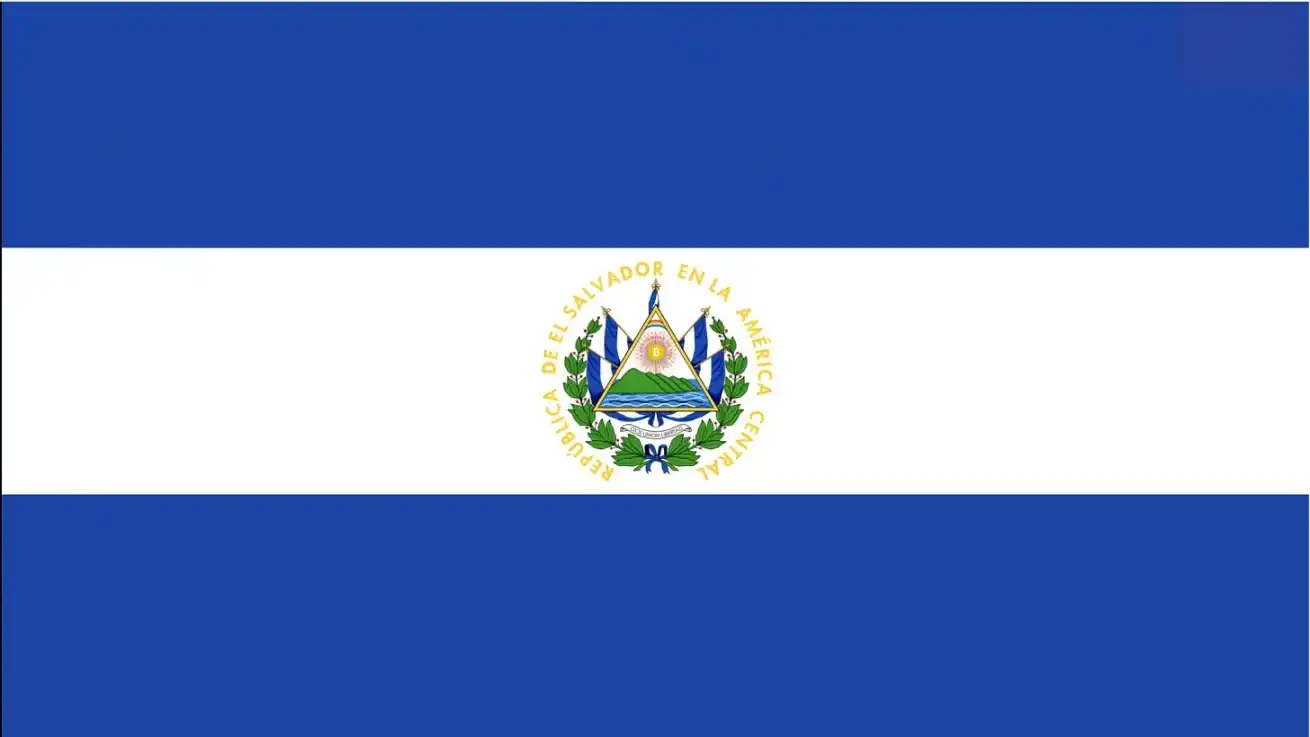
When El Salvador made Bitcoin legal tender in 2021, it was not just about adopting a cryptocurrency but declaring financial independence. President Nayib Bukele viewed it as a symbol of resistance against the dollar's dominance and a lifeline for the unbanked. Three years later, this resistance encountered a $1.4 billion barrier: the IMF.
The Cost of Bailout
To secure a loan in 2024, El Salvador agreed to abolish key pillars of its Bitcoin policy:
- Voluntary Acceptance: Businesses are no longer required to accept Bitcoin.
- Public Sector Ban: Government entities are prohibited from conducting Bitcoin transactions or issuing debt, including a ban on tokenized instruments linked to Bitcoin.
- Bitcoin Accumulation Freeze: All government purchases are halted (the 6,000+ BTC reserve is now frozen), and a comprehensive audit of holdings must be completed by March 2025.
- Trust Fund Liquidation: Fidebitcoin (conversion fund) will be dissolved under the premise of transparent auditing.
- Gradual Phase-Out of Chivo Wallet: Investigations showed that most users converted BTC to USD, and the $30 incentive program will be phased out.
- Tax Rollback: The dollar becomes the sole option for taxes, eliminating Bitcoin's utility as a sovereign payment.
Bukele's Strategic Retreat
El Salvador's compromises make fiscal sense:
- As bond repayments approach, the loan stabilizes the debt (84% of GDP).
- Dollarization remains intact (the dollar is still the primary currency).
However, given Bukele's statements in 2021, this regression is shocking. The low usage rate of the Chivo wallet may have driven his concessions.
What Remains of the Experiment?
The IMF has not killed El Salvador's Bitcoin; it has merely stifled official adoption. Grassroots usage continues:
- Bitcoin Beach remains operational and, in fact, is thriving.
- The tourism industry attracts more and more Bitcoin enthusiasts.
But without national support, at least in the short term, Bitcoin's role may shrink to that of a niche tool rather than a monetary revolution.
The Path Forward
There are two scenarios for the future of Bitcoin in El Salvador:
- Slow Fade: As IMF conditions fully take effect, Bitcoin becomes a curiosity for tourists.
- Shadow Revival: The private sector sustains its existence in the face of government retreat.
One thing is clear: when the IMF writes a check, it also sets the rules.
Key Points
- The IMF loan forced El Salvador to reverse six key Bitcoin policies.
- It set a precedent for other countries seeking IMF support.
- Grassroots Bitcoin usage may prove more enduring than government involvement.
El Salvador has made many concessions on the Bitcoin issue. While it can be argued that this does not harm El Salvador significantly, it sends a strong signal to other Latin American countries (like Ecuador and Guatemala) that have been observing El Salvador and considering replicating its strategy (until they verify their own scale of IMF loans). Therefore, overall, this is a partial victory for the IMF and a partial victory for El Salvador.
4. Bhutan: A Success Story of Breaking Free from IMF Constraints

Bhutan's Bitcoin experiment has been underway for two years, meaning we now have some reliable data on how it impacts the economy.
The IMF warns that countries embracing Bitcoin will undermine economic stability, reduce the efficiency of attracting foreign direct investment, and jeopardize decarbonization and environmental initiatives. It specifically expressed concerns about the "lack of transparency" in Bhutan's crypto adoption.
What Does the Data Say?
- Bitcoin reserves directly meet urgent fiscal needs. "In June 2023, Bhutan allocated $72 million from its Bitcoin holdings to raise civil servant salaries by 50%."
- Bhutan was able to "leverage Bitcoin reserves to avoid a crisis as foreign exchange reserves dwindled to $689 million."
- Prime Minister Lotay Tshering stated in an interview that Bitcoin also "supports free healthcare and environmental projects."
- Tshering also mentioned that their Bitcoin reserves help "stabilize the country's $3.5 billion economy."
- Independent analysts noted, "This model can attract foreign investment, especially for countries with untapped renewable resources."
- Given that the IMF's analysis is not only incorrect but almost entirely inverted, this raises the question: Are the IMF's predictions based on data?
5. Five Possible Reasons the IMF Might Fear Bitcoin

"Get all your friends, liberals, Democrats, Republicans, everyone to buy Bitcoin—and then it will democratize." John Perkins said at the Bitcoin conference in 2025.
What if the IMF's biggest fear is not inflation… but Bitcoin? Can Bitcoin break the IMF/World Bank's debt control?
In my recent conversation with John Perkins (author of "Confessions of an Economic Hitman"), some things became clear. Alex Gladstein had previously sharply exposed how the IMF's "structural adjustments" did not eliminate poverty but rather enriched creditor nations. Perkins supplemented this with his own firsthand accounts.
Perkins revealed to me how the Global South became trapped in a debt cycle: a design aimed at funneling wealth to the West. But the turning point is that Bitcoin has already dismantled this script in five key areas.
1) Lowering Remittance Costs to Loosen the Debt Shackles

Chris Collins' sculpture depicts the debt noose.
Remittances (money sent home by migrant workers) often constitute a significant portion of GDP in developing countries. Traditional intermediaries like Western Union charge fees as high as 5-10%, which amounts to a hidden tax. For countries like El Salvador or Nigeria, central banks must store dollars to stabilize their currencies, and these dollar reserves are often provided by the IMF.
Bitcoin Changes the Game
With the Lightning Network, transaction fees have dropped to nearly zero, and payments are received in seconds. In 2021, El Salvador's President Bukele optimistically predicted that Bitcoin could save $400 million in remittance fees. However, the reality is that there is little evidence to suggest that remittance costs using Bitcoin are approaching this threshold. Nevertheless, its potential is evident: more Bitcoin remittances will lead to higher dollar reserves, thereby reducing the need for International Monetary Fund (IMF) loans.
It's no wonder the IMF mentioned Bitcoin 221 times in the loan conditions for El Salvador in 2025; they want to maintain their status as a relevant lending institution.
Bitcoin not only makes remittances cheaper but also completely bypasses the dollar system. In Nigeria, where the naira is weak, households are now holding Bitcoin as a harder asset than the local currency. There is no need for the central bank to deplete dollar reserves, nor for IMF bailouts.
The numbers speak for themselves:
- Pakistan loses $1.8 billion annually due to remittance fees, which Bitcoin could save most of.
- El Salvador has already saved over $4 million annually with just 1.1% of remittances in Bitcoin.
Currently, the application of Bitcoin is not fully widespread. Only 12% of Salvadorans regularly use Bitcoin, while over 5% of remittances in Nigeria are conducted through cryptocurrency. But the trend is clear: every Bitcoin transfer weakens the cycle of debt dependency.
The IMF sees a threat. The question is: how quickly will this silent revolution spread?
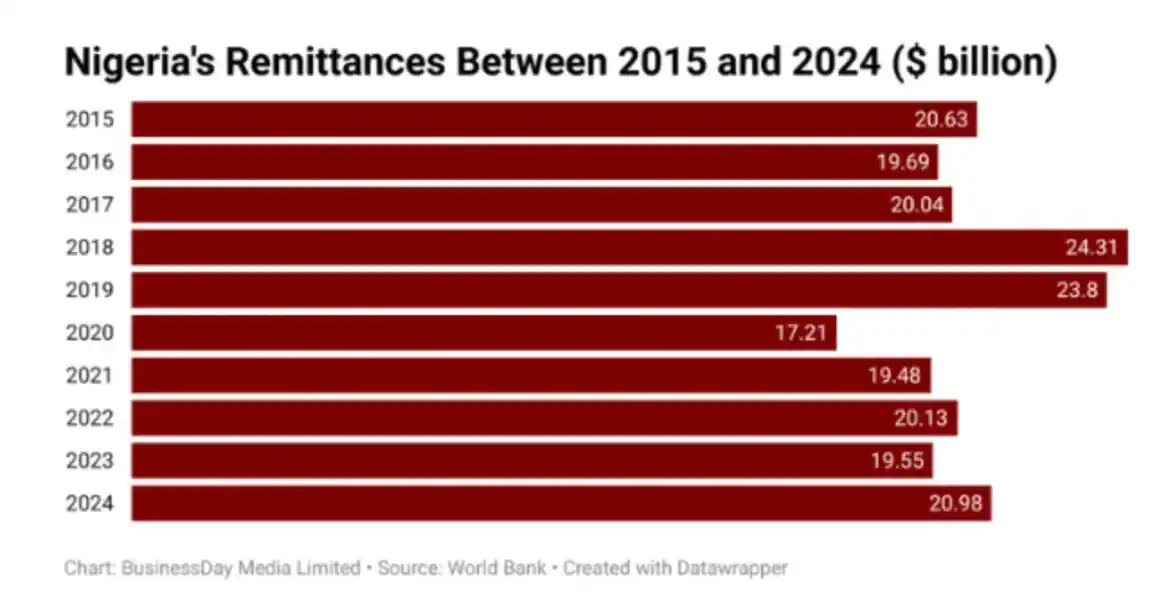
In 2024, Nigeria's total remittances approached $21 billion, accounting for over 4% of GDP.
2) Evading Sanctions and Trade Barriers
Oil-rich Iran, Venezuela, and Russia have been restricted in their access to dollars due to U.S. sanctions imposed in 1979, 2017, and 2022, respectively, leading to a significant reduction in oil exports.
Regardless of whether we agree with the ideologies of these countries, Bitcoin has broken this cycle. Iran has been using Bitcoin to "export oil" to evade sanctions, while Venezuela has been using Bitcoin to pay for imports, circumventing sanctions.
Iran is also mining by monetizing energy exports to evade sanctions, avoiding the IMF's "reform for cash" ultimatum while keeping the economy running. As Russia and Iran lead the way in Bitcoin oil trading, the control of petrodollars is weakening.
Another country using Bitcoin to avoid sanctions and economic hardship is Afghanistan, which is using Bitcoin for humanitarian aid. NGOs like "Incentive Code" have bypassed the Taliban's bank freezes, and the "Digital Citizen Fund" has provided aid using Bitcoin after the Taliban takeover, preventing some families from starving.
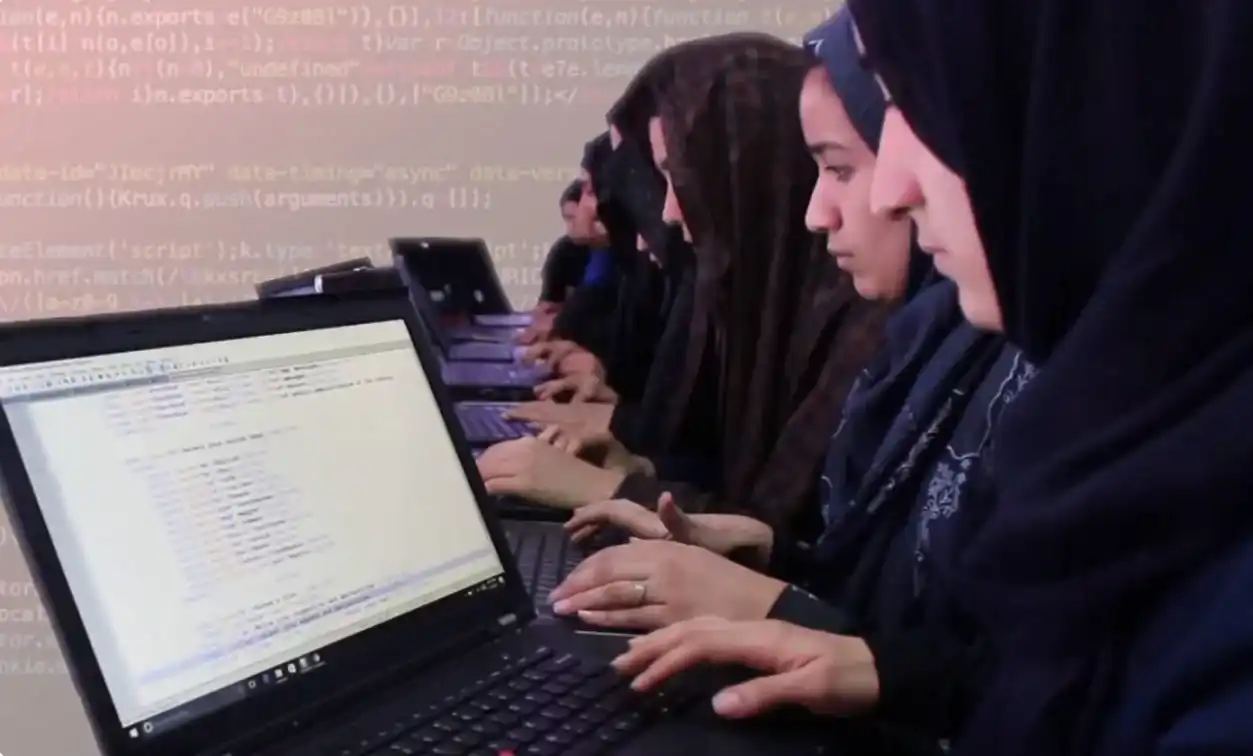
The Afghan NGO "Incentive Code" uses Bitcoin donations that the Taliban cannot intercept to train women in software development.
Although Bitcoin's share in sanctioned trade is small, accounting for less than 2% of oil exports in Iran and Venezuela, the trend is growing.
Sanctions are a key tool of geopolitical leverage, often supported by the IMF and World Bank as they align with major economies like the U.S. Countries under sanctions using Bitcoin reduce the IMF's control over capital flows while threatening the dollar's dominance.
3) Using Bitcoin as a Shield Against National Inflation
When countries like Argentina face hyperinflation, they borrow dollars from the IMF to support foreign exchange reserves and stabilize their currencies. However, once they are unable to repay, they ultimately face austerity measures or are forced to sell strategic assets at low prices. Bitcoin offers an escape route as a global, non-inflationary currency that is not subject to government regulation and can appreciate in value.
El Salvador's experiment shows that Bitcoin can reduce dependence on the dollar. By holding Bitcoin, countries can hedge against currency collapse without needing IMF loans. If Argentina had allocated 1% of its reserves to Bitcoin in 2018, it could have offset over 90% of the peso's depreciation that year, avoiding IMF assistance. The neutrality of Bitcoin also means that no single entity can impose conditions, unlike the IMF's loan requirements for privatization or unpopular reforms. In encouraging Bitcoin adoption, it has neither debt leverage nor the IMF's long history to draw upon. However, due to the Lindy effect (see below), Bitcoin becomes a more viable alternative each year.

Lindy Effect: The longer something has been successful, the more likely it is to continue to succeed.
4) Bitcoin Mining: Turning Energy into Debt-Free Wealth
Many developing countries are rich in energy but burdened by debt, trapped in the IMF's loans for infrastructure like dams or power plants. When defaults occur, these loans require cheap energy exports or resource concessions. Bitcoin mining disrupts this model by converting stranded energy (like flared natural gas or surplus hydropower) into liquid wealth without intermediaries or transportation costs.
Paraguay earns $50 million annually from hydropower mining, covering 5% of its trade deficit. Ethiopia made $55 million in just 10 months. Bhutan is a standout: with $1.1 billion in Bitcoin (36% of its $3.02 billion GDP), its hydropower mining could generate $1.25 billion in wealth annually by mid-2025, repaying its $403 million World Bank and $527 million Asian Development Bank debts. Unlike IMF loans, the value of mined Bitcoin appreciates and can serve as collateral for non-IMF borrowing. This model of monetizing energy without relinquishing assets terrifies the IMF, as it undermines its control over the energy sector.

Bhutan's Prime Minister Tshering Tobgay calls Bitcoin a "strategic choice to prevent brain drain."
5) Grassroots Bitcoin Economies: Bottom-Up Power
Bitcoin is not only applicable to nations but also to communities. In El Salvador's Bitcoin Beach or South Africa's Bitcoin Ekasi, locals have been using Bitcoin for everyday transactions, savings, and community projects like schools or clinics. These circular economies are often sparked by charitable initiatives aimed at self-sufficiency. In Argentina, where inflation often exceeds 100%, by 2021, 21% of people were using cryptocurrency to protect their wealth. If these models are scaled, they could reduce reliance on national debt financing projects, which is certainly what the IMF fears most.
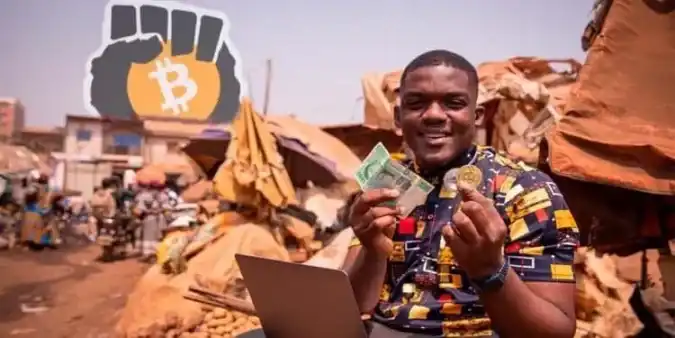
The founder of Bitcoin Ekasi, Hermann Vivier, stated that his community was inspired by El Salvador's Bitcoin Beach to replicate their Bitcoin circular economy in South Africa.
Conclusion
By enhancing local resilience, Bitcoin weakens the IMF's "crisis leverage." Thriving communities do not need bailouts, so the IMF cannot demand privatization to repay loans. In Africa, projects like Gridless Energy have already used renewable microgrids tied to Bitcoin mining to lift 28,000 rural Africans out of energy poverty, reducing the need for large projects supported by the IMF. If thousands of towns adopt this model, dollar shortages will no longer matter, and trade can bypass the dollar system.
Although the IMF occasionally spreads misinformation about Bitcoin's energy consumption and environmental impact to hinder its adoption, its more powerful tool is leveraging its financial influence over debtor nations to "encourage" compliance with its Bitcoin-free future vision.
The IMF has opposed Bitcoin adoption in El Salvador, the Central African Republic, and Argentina. Now, they are opposing Pakistan's intention to mine Bitcoin as a nation-state. The expansion of these grassroots forces may compel the IMF to take more direct countermeasures.

Children in South Africa's poorest villages learn to surf through the Bitcoin Ekasi project.
Grassroots Bitcoin economies empower communities to thrive without IMF bailouts. We need the power of the people to find new innovative ways to counter the IMF's strikes.
免责声明:本文章仅代表作者个人观点,不代表本平台的立场和观点。本文章仅供信息分享,不构成对任何人的任何投资建议。用户与作者之间的任何争议,与本平台无关。如网页中刊载的文章或图片涉及侵权,请提供相关的权利证明和身份证明发送邮件到support@aicoin.com,本平台相关工作人员将会进行核查。




